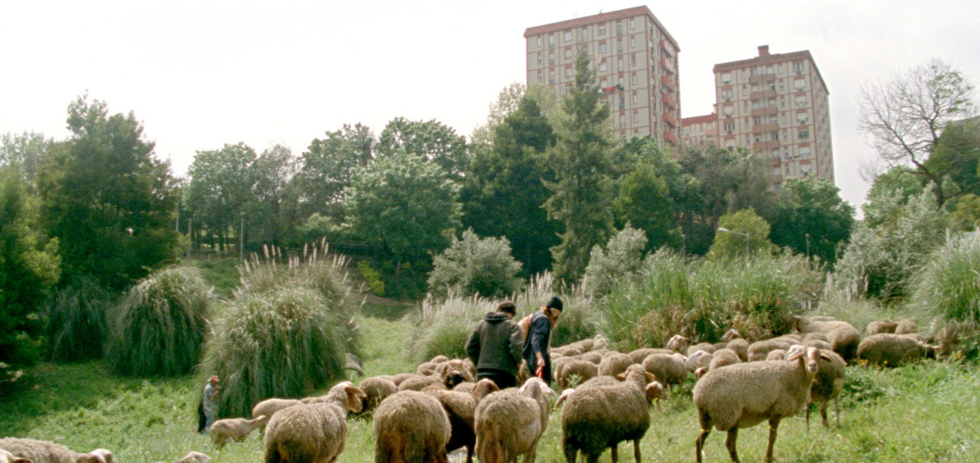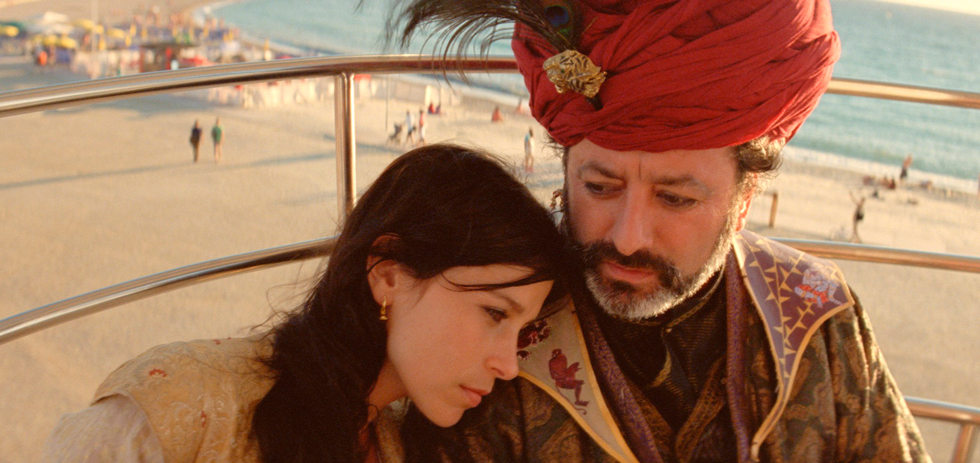
When Miguel Gomes’ Tabu became an unlikely box office crossover hit in 2012, few could guess the trajectory his career would take in the wake of that critical and commercial success. Furthermore, although that film fits neatly into a thematic overview of the Portuguese auteur – delving into Portuguese history and culture, and interested in notions of storytelling itself – in hindsight the tightly controlled, 118-minute film looks like an anomaly of sorts in its rigid formalism and discipline. It has been said of Roberto Rossellini that no-one could ever predict what his next film would look like, and Gomes so far seems to have been the next exciting voice in that tradition – a film of his could be twenty minutes long or in this case, in excess of six hours – and varying stylistically, and yet few directors project their voice so clearly through everything they touch. His three-part Arabian Nights is a constantly evolving, spontaneous film that finds the master at his most dizzyingly unrestrained and mammoth in scope. On-screen text spells out the films aims – to draw on the loose structure of the Arabian Nights legends to explore the current socio-economic climate in Portugal under oppressive austerity measures by their Government “apparently devoid of any sense of social justice”.
The first of the three films, The Desolate One, sets up the overarching structure and premise, but not before an absurd prologue. Intermittently talking about the closure of a dockyard as well as wasp hunting, we meet Gomes the director, running off from the crew, before being tracked down and threatened to be killed by the cast and crew unsure if they’ll receive payment for their work. He then asks to be spared his life if he can tell them fantastical stories. Just as we think this will be the format of the film, he starts talking about Scheherazade, and how she did the exact same thing. It’s a confusing, fun opening; a meta-commentary on filmmaking in a similar vein to his earlier Our Beloved Month of August (2008), but in a clever way – directly tying the actual production of the film itself into the anxieties of Portugal under austerity, rather than a Dickensian ‘from above’ tale of economic woes. Of the tales in the first film, the most notable might be “The Men With Hard-ons”, a segment that is the most direct continuation of Gomes previous film, Redemption (2013), directly drawing on the European politicians’ personal regrets and insecurities to illuminate their perceived inaction, this time literalising their impotence. 1 The remainder of part one tackles humorous, borderline surreal scenes such a beached whale and a long stretch of documentary like testimonials of those out of work and suffering in Portugal’s economy – perhaps the overarching feeling the first film leaves us with is Gomes struggling with how best to explore these issues, by comedy or tragedy, or by fiction or non-fiction. This is a question he never resolves, and will linger over the next two films.
The Reckless One feels significantly different, through three long stories. The first is about a criminal on the run (called Simao “Without Bowels”); the punchline works as the apprehended criminal is celebrated for defying the authorities despite his crimes of extreme violence, tapping into the currents of anti-establishment anger running through Portuguese society, but drawing strength from the languorous, often silent passages we spend with him through increasingly hallucinatory scenes. The last scenes as well are almost neorealist in tone, set in some high-rise buildings as a dog, Dixie, is passed off between owners who cannot afford to care for him. However the centrepiece of the film, and arguably the entire trilogy, is a court-room scene that, like many scenes, arrives out of a strange digression. A young girl calls her mother to mention that she has just lost her virginity; her mother offers supporting words before putting the phone down, revealing she is a judge in what first seems like a Judge Judy type dispute over stolen furniture. The most overtly surreal episode in Arabian Nights, the defendant admits to the theft, but makes aspersions about the plaintiff’s behaviour, which he justifies as being under the influence of a genie (also present in the courtroom, who confirms the story) and so begins a chain of excuses and duress, part of a ridiculous saga involving a mystical cow, a mysterious Chinese investor among a dozen or so other characters. It’s riotously funny and in its baton-changing narrative structure and surreal nature it evokes later works of Luis Buñuel like The Phantom of Liberty and The Discreet Charm of the Bourgeoisie, but it illuminates much of the wider films as well; this notion of ‘passing the buck’ and follow-on consequences that arise in a socio-economically struggling society, and on a pure dramatic level re-establishes Gomes’ fascination with the very notions of storytelling.

Most contentious and divisive, however, seems to be the final installment, The Enchanted One. Unexpectedly, we are thrust back into the narrative of Scheherazade, who until that point had remained mostly an off-screen narrator. It feels like a fresh breath of air, with Sayombhu Mukdeeprom (Apichatpong Weerasethakul’s regular cinematographer) finally bringing more colour and wonder to what has been shot in flatter, more documentary like tones over the first few films. As a segment of old-fashioned myth and escapism, it’s a beautiful segment of film as Scheherazade tries to escape the mad King and meets other figures of myth, like Paddleman (though Gomes’ playful tendencies take rein, and can’t help but experiment with deliberate anachronisms; through all the media coverage of the film so far the ferris wheel scene seems to have already assumed its place as the iconic image of the film). And then the other shoe drops; a long mini-documentary2 about a community of competitive bird-trappers that is probably the longest segment in the film, and mileage will vary with this one. Where I found understated black humour (the first ten places in the competition are given trophies) some found banality; regardless of your stance it definitely plays as particularly antagonistic when the following segment, ‘Hot Forest’, an intriguing diary of a Chinese exchange student, is aborted after a few minutes to revert back to the bird-trappers. I’m loath to use the word ‘troll’ in film criticism but if there’s a better term to describe some of Gomes’ cheeky sleight-of-hand tricks like this I haven’t come across it.
Arabian Nights is a film of three parts, but rewards close viewing in both senses of the word, as they are ripe for considered viewing close together, something to consider for the no doubt puzzled distributors that take a chance on the trilogy. It’s a sprawling, deliberate mess of a film, with no clear boundaries or edges which, to adventurous viewers, provides a feeling of freedom and genuine spontaneity rarely experienced in cinemas (though there are stretches of filler, perhaps inevitable in such a project). But the connections between the film exist in recurring tropes or gags (bird sounds) and thematic threads drawn through – the connections between the court scene, the episode of Dixie the dog and the delightful rooster sequence (which I hadn’t yet mentioned all) look at notions of passing on the blame, of fluid economical responsibilities in a country where no-one can foot the bill. Unemployment underlies most characters and sequences and Gomes relishes in making a film both ostensibly a piece of escapism from the present, while a biting satire aimed at those same circumstances. With this in mind, there are also just untold numbers of pleasures to be had here as well; with a final shot set to music that moved me immensely, leaving the cinema in a state of near euphoria. Combined with Gomes’ penchant for exploring storytelling devices, this collage of fiction, legend and documentary filmmaking makes Arabian Nights one of the year’s most ambitious and essential films.
Around the Staff
| Jessica Ellicott | |
| Ivan Cerecina | |
| Ian Barr | |
| Imogen Gardam | |
| Conor Bateman | |
| Jeremy Elphick | |
| Dominic Ellis | |
| Felix Hubble | |
| Matilda Surtees* |
* = rating based on Parts I and II.
